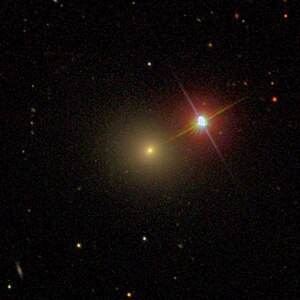NGC 277
| Galaxy NGC 277 |
|
|---|---|

|
|
| SDSS recording | |
| AladinLite | |
| Constellation | whale |
|
Position equinox : J2000.0 , epoch : J2000.0 |
|
| Right ascension | 00 h 51 m 17.2 s |
| declination | -08 ° 35 ′ 49 ″ |
| Appearance | |
| Morphological type | S0 - |
| Brightness (visual) | 13.7 mag |
| Brightness (B-band) | 14.7 mag |
| Angular expansion | 1.40 × 1.2 |
| Position angle | 50 ° |
| Surface brightness | 14.3 mag / arcmin² |
| Physical data | |
| Redshift | 0.014283 ± 0.000050 |
| Radial velocity | 4282 ± 15 km / s |
|
Stroke distance v rad / H 0 |
(194 ± 14) · 10 6 ly (59.4 ± 4.2) Mpc |
| history | |
| discovery | Heinrich Ludwig d'Arrest |
| Discovery date | October 8, 1864 |
| Catalog names | |
| NGC 277 • PGC 2995 • MCG -02-03-028 • 2MASX J00511725-0835485 • GC 5120 • 2MASS J00511724-0835487 • LDCE 47 NED003 | |
NGC 277 is an elliptical galaxy of Hubble type e-S0 in the constellation Cetus south of the celestial equator . It is estimated to be 194 million light-years away from the Milky Way and has a diameter of about 80,000 light years
. a. the galaxies NGC 270 and NGC 291 .
The object was discovered on October 8, 1864 by the German-Danish astronomer Heinrich Ludwig d'Arrest .
